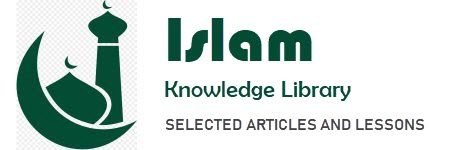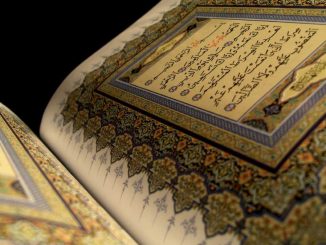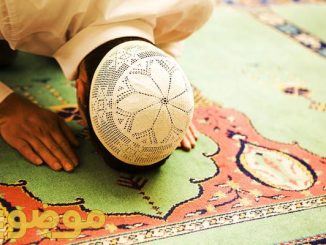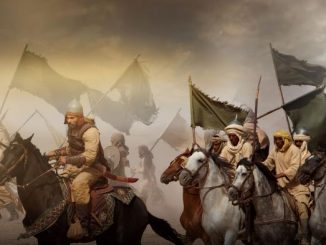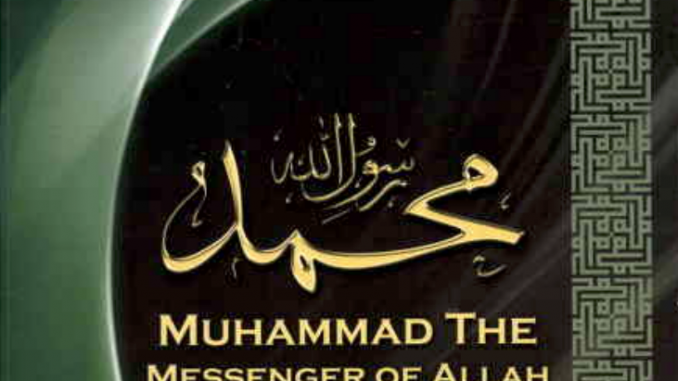
Prophet Muhammad , the Messenger of Allah. This book introduces an overview about the life of the last and final Prophet and Messenger of GOD “ALLAH” , including his conduct, his approach in dealing with Muslims and non Muslims, how he suffered to spread the word of Islam, guiding mankind to worship one and unique God (Allah)) suffering to spread the word of Islam that his people offered to appoint him as king in return for leaving the call, but he refused.
The introduction includes proper translation of important terms of Islam; Rubb..etc
Terminology used in this Book
(Taken from Sheik Mahmoud’s Book “a ‘Common mistakes in Translation)
1. Rubb: Some prefer to translate the term ‘#Rubb’ into ‘Lord.’
Beside the fact that the latter is a Biblical term referring to the alleged lordship of the slave of Allatu #Prophet Jesus,
the word ‘lord’ which is limited to ‘master’, ‘chief’, ‘proprietor’, or ‘ruler’,
can never convey the comprehensive declaration of the term ‘Rubb’.
Among other signage, the term ‘Rubb’ means, the Creator, the Fashioner, the Provider,
the One upon Whom all creatures depend for their means of subsistence, and the One Who gives life and causes death.
2. Deen: The #word translated as religion is ‘Deen’,
which in Arabic commonly refers to a way of #life,
which is both private and public.
It is an inclusive term meaning: acts of #worship, political practice,
and a detailed code of conduct, including hygiene or etiquette matters.
3. Sal’lal’laahu a’Iaihi ws sal’lam. Some translate it as ‘peace be upon him’.
This translation is incorrect; the correct translation is, ‘may Allah exalt his mention,
and render him and his household safe and secure from every derogatory thing’.
introduction
All praise is due to God, the Lord[1] of the worlds, and may God #praise Prophet Muhammad, and render him and his household safe and secure from all evil.
When talking about Prophet Muhammad (e)[2], one should keep in mind that he is talking about the greatest individual in history.
This is not a baseless claim; for the one who reads his biography and learns of his mannerisms and ethics, while keeping aside all preconceived notions, would certainly reach this conclusion.
Some fair and just non-Muslims have reached this conclusion as well.
The late Professor Hasan Ali, may #God have mercy on him, said in his magazine ‘Noor al-Islam’ that a Brahmin[3] colleague of his once told him:
“I recognize and believe that the Messenger of #Islam is the greatest and most mature man in history.”
Professor Hasan Ali, may God have mercy on him, asked him: “Why do you consider him as the greatest and most mature man?” He replied:
No man possessed the characteristics, mannerisms and ethics that he possessed at one time.
He was a king under whom the entire peninsula was unified; yet he was humble.
He believed that the dominion belonged to his God alone.
Great riches would come to him, and yet he lived in a state of poverty; fire would not be lit in his house for many days, and he would stay hungry.
He was a great leader; he led small numbers into battle against thousands, and yet he would decisively defeat them.
Peace
He loved peace agreements and would agree to them with a firm heart,
even though he had thousands of his brave and courageous #Companions by his side.
Each Companion was very brave and could confront a thousand enemies alone, while not feeling the least bit intimidated.
Yet, the Prophet was kind-hearted, merciful, and did not want to shed a drop of blood.
He was deeply concerned about the affairs of the Arabian Peninsula, yet he did not neglect the affairs of his family, household, or the poor and needy.
He was keen to disseminate Islam amongst those who had gone astray.
In general, he was a man concerned with the betterment and wellbeing of mankind, yet he did not indulge in amassing worldly fortune.
He busied himself with the worship of God and loved doings deeds which pleased Him.
He never avenged himself on account of personal reasons.
He even prayed for his enemies’ wellbeing, and would warn them of the punishment of God.
He was an ascetic regarding worldly affairs and would worship God throughout the night.
He was the brave and courageous soldier who fought with the sword – and the infallible Prophet – the conqueror who conquered nations and countries.
He slept on a mat of hay and a pillow filled with coarse fibers.
People crowned him as the Sultan of the Arabs, or #King of the Arabian Peninsula,
yet his family lived a simple #life, even after they received great fortunes;
the riches were piled in the Mosque.
Fatima[4] complained to him about the strenuous work she did, the grinding stone and water jug which she used to carry – how they had left marks on her body…
He did not give her a portion of that wealth; instead, the Prophet (e) taught her a few words and supplications.
His Companion Umar[5] came to his house and looked in his room, and saw nothing but a hay mat which the Prophet was sitting on, which had left marks on his body.
The only provisions in the house were half a Saa’[6] of barley in a container, and a water skin that hung on the wall –
this is all the Messenger of God owned at a time when half the Arabs were under his control.
When Umar saw this, he could not control himself and wept.
The #Messenger of God (e) said:
“Why are you weeping O Umar?”
He replied: “Why shouldn’t I weep – Khosrau and Caesar enjoy themselves in this world and the Messenger of God (PBUH) only owns what I see!”
He responded: “O Umar, wouldn’t it please you that this is the share of Khosrau and Caesar in this life, and in the Hereafter this pleasure would be for us alone?”
When the Prophet examined his troops prior to the occupation of Makkah,
Abu Sufyan stood beside al-Abbas, the uncle of the Prophet (e) and they looked at the banners of the Muslim army.
Abu Sufyan at that time was not a Muslim.
He was amazed by the vast number of Muslims; they advanced towards Makkah like a torrent of water.
No one could stop them and nothing stood in their way. Abu Sufyan then said to al-Abbas:
‘O Abbas, your nephew has become a grand King!’ al-Abbas responded saying:
‘This is not kingship, rather prophethood, and the Message of Islam.’
A’dee at-Ta’ee, the son of Ha’tim at-Ta’ee who is the paradigm of generosity, attended the assembly of the Prophet (e) while he was still a Christian.
When he saw how the Companions aggrandized and respected the Prophet (PBUH) , he was confused – was he a Prophet or a king? He asked himself, “Is he a king or a Messenger of the Messengers of God?”
While he was pondering over this, a destitute woman came to the Prophet (PBUH) and said: “I wish to tell you a secret.”
He said to her: “In which road in Madeenah do you want me to meet you?’ The Prophet (PBUH) left with the destitute maid and took care of her needs.
When Ad’ee saw the humbleness of the Prophet (PBUH), he realized the truth and discarded the crosses that he was wearing and became a Muslim.
We will mention some #statements of the Orientalists concerning Muhammad (PBUH).
We as #Muslims firmly believe in the Prophet (PBUH) and his Message, and as such, do not need the statements of non-Muslims to establish this fact.
We are mentioning these statements for the following two reasons:
- To serve as a reminder and admonition for name-sake Muslims who have abandoned their Prophet and his teachings,
so that they would heed and return to their religion.[7] - So that non-Muslims would know who the Prophet is from the statements of their own people, so that they would be guided to Islam.
I ask all readers to not hold any preconceived notions when searching for the truth, whether it be this or any other Islamic material.
I ask God to open their hearts and chests to accept the truth, and to show them the right path and inspire them to follow it.
Notes
[1] The actual word used in the Qur’an is Rubb.
There is no proper equivalent for Rubb in the English language.
It means the Creator, the Fashioner, the Provider,
the One upon Whom all creatures depend for their means of subsistence, and the One Who gives life and causes death.
[2] This Arabic term means, “may God praise him and render him safe from all evil.”
[3] Brahmin: member of the highest of the four Hindu castes: the priestly caste.
[4] Fatimah was one of the daughters of the Prophet, may God praise him.
[5] One of the Prophet’s close companions, and the second Caliph after his death.
[6] Saa’: a measure of capacity equal to four handfuls of the two hands held together.
[7] The word translated as religion is ‘Deen‘, which in Arabic commonly refers to a way of life, which is both private and public.
It is an inclusive term meaning: acts of worship, political practice, and a detailed code of conduct, including hygiene or etiquette matters.
Table of Contents
- Terminology used in this book
- Introduction
- Who is the Messenger?
- His lineage
- Place of birth and childhood
- The description of the Prophet
- Prophet’s manners & Characteristics
- Some of the Prophet’s ethical manners
- Statements of justice and equity
- The wives of the Prophet
- Textual proofs
- Proofs from the Qur’an
- Proofs from the Sunnah
- Previous Scriptures
- From the Gospel
- Intellectual proofs
- What the Testimony of Faith entails
- Conclusion
- Glossary
End of this article : Prophet Muhammad
Muhammad The Mesenger
Written by : Abdurrahman al-Sheha
